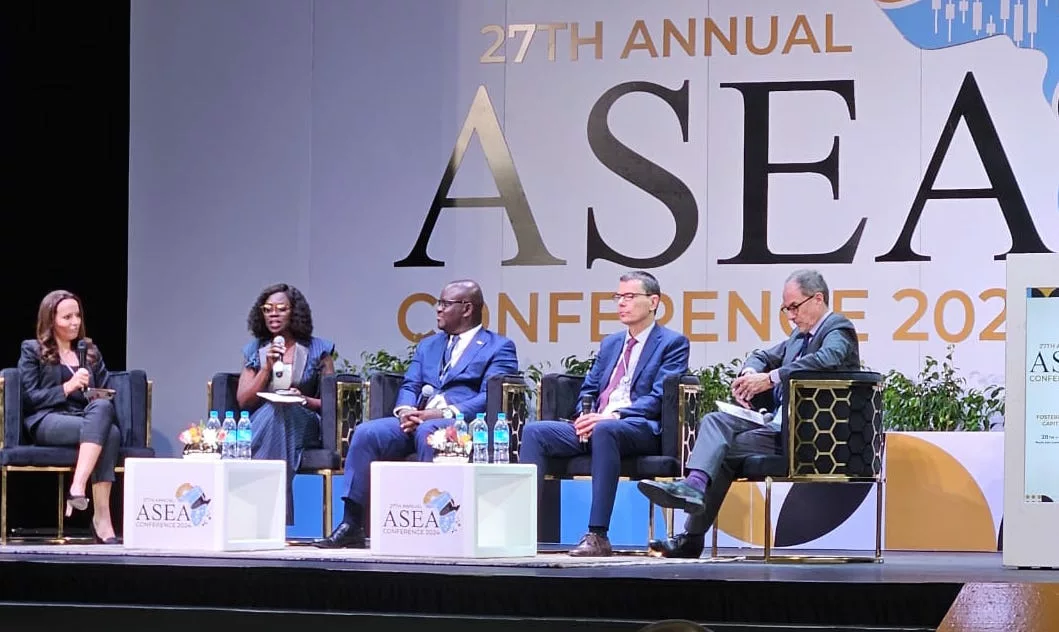|
Getting your Trinity Audio player ready...
|
Botswana – Leaders in African securities exchanges have highlighted the need for increased collaboration among African stock exchanges to foster cross-border investment and market integration.
At a recent CoSSE Conference held in Botswana, prominent leaders in African finance, including ESCROW Group CEO, Mr. Collen Tapfumaneyi and Stock Exchange of Mauritius CEO, Mr. Sunil Benimandhu, engaged in a thought-provoking panel discussion that centered on advancing financial inclusion, democratising African capital markets, and fostering cross-border investments within the continent.
MR Tapfumaneyi emphasized the importance of financial inclusion and democratisation of African capital markets. He noted that currently, less than 5% of the African population actively participates in these markets, despite a growing entrepreneurial spirit among African youth.
To address this, Escrow Group is developing innovative platforms to enable both investors and small and medium-sized enterprises (SMEs) to access capital markets more easily. These platforms leverage technology to facilitate seamless transactions and reduce barriers to entry.
He noted the acute under-participation of Africans in the capital markets with some regions seeing as little as 1% participation. This low engagement, he argued, underscores the necessity for targeted efforts to bring more Africans into the fold, especially given the continent’s projected population of 9,5 billion by 2050.
“There is a growing trend of entrepreneurship among African youth that needs to be taken care of, which means they need to be given access to capital. They need to be given access to capital markets,” he said.
“It is therefore critical for capital markets, especially exchanges, to be deliberate on democratising markets so that they are widely accessible,” added Mr. Tapfumaneyi.
In light of this, Escrow Group has focused on democratising access to these markets through innovative technologies and platforms. The company has partnered with securities exchanges across countries like Zimbabwe, Kenya, Zambia, and Tanzania to introduce mobile platforms that expand investor access.
These platforms leverage mobile networks and mobile money systems to ensure that users can participate in capital markets without needing to visit physical locations. The initiatives target individuals traditionally excluded from the financial ecosystem, such as small enterprises and brokers.
Mr. Tapfumaneyi also emphasised the importance of supporting small and medium-sized enterprises (SMEs) by creating accessible, technology-driven solutions for capital raising.
By enabling SMEs to tap into capital markets seamlessly, ESCROW Group aims to bolster entrepreneurship, which is increasingly vibrant among African youth. These efforts not only democratise access but also ensure that Africa’s entrepreneurial spirit is nurtured.
Mr Sunil Benimandhu brought another layer to the discussion, addressing how African stock exchanges are collaborating to develop sustainable solutions for market integration and cross-border investments. He pointed to the African Exchange Linkage Project, supported by the African Development Bank, as a promising initiative aimed at harmonizing regulatory frameworks and operational standards across the continent. However, he also outlined three critical challenges that need to be addressed to unlock its full potential.
Mr. Sunil Benimandhu emphasized the significant costs associated with cross-border trading, such as fees and currency conversion expenses. He argued that these costs can deter potential investors. To address this, he proposed collaborating with regional organizations and policymakers to reduce these barriers and make cross-border investments more appealing. Additionally, Mr. Sunil Benimandhu highlighted the importance of technology and its related costs. He suggested forming partnerships with system vendors as a strategic approach to manage costs and streamline the procurement of necessary systems.
Lastly, he underscored the importance of African companies competing effectively on a global scale. With investors having access to markets worldwide, African issuers must demonstrate strong growth potential to attract both local and international investments. Enhancing competitiveness and positioning African companies as global investment magnets are essential to achieving this goal.
The panel discussion illuminated both the challenges and opportunities in Africa’s capital markets. From addressing low participation rates to fostering cross-border integration, the leaders provided actionable insights and strategies for ensuring that African markets evolve to meet the needs of a growing and dynamic population.
As the continent strives to democratise and integrate its financial systems, innovative solutions and collaborative efforts like those discussed at the CoSSE Conference will play a pivotal role in shaping the future of African finance.






